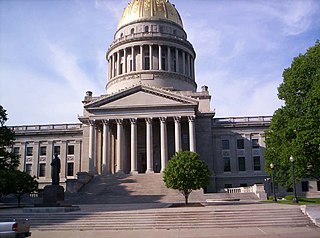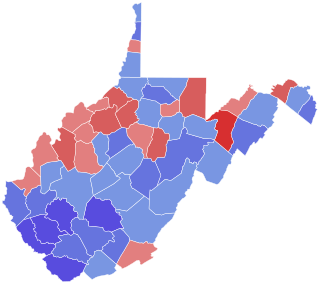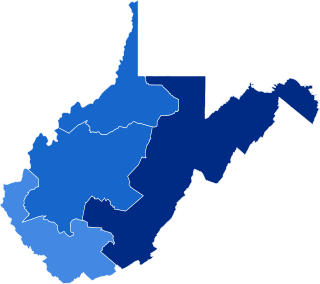
From the time of the Great Depression through the 1990s, the politics of West Virginia were largely dominated by the Democratic Party. In the 2000 presidential election, George W. Bush claimed a surprise victory over Al Gore, with 52% of the vote; he won West Virginia again in 2004, with 56% of the vote. West Virginia is now a heavily Republican state, with John McCain winning the state in 2008, Mitt Romney in 2012 and Donald Trump in 2016, 2020, and 2024.

The 1870–71 United States Senate elections were held on various dates in various states. As these U.S. Senate elections were prior to the ratification of the Seventeenth Amendment in 1913, senators were chosen by state legislatures. Senators were elected over a wide range of time throughout 1870 and 1871, and a seat may have been filled months late or remained vacant due to legislative deadlock. In these elections, terms were up for the senators in Class 2.

The 1868–69 United States Senate elections were held on various dates in various states. As these U.S. Senate elections were prior to the ratification of the Seventeenth Amendment in 1913, senators were chosen by state legislatures. Senators were elected over a wide range of time throughout 1868 and 1869, and a seat may have been filled months late or remained vacant due to legislative deadlock. In these elections, terms were up for the senators in Class 1.

The 1898–99 United States Senate elections were held on various dates in various states. As these U.S. Senate elections were prior to the ratification of the Seventeenth Amendment in 1913, senators were chosen by state legislatures. Senators were elected over a wide range of time throughout 1898 and 1899, and a seat may have been filled months late or remained vacant due to legislative deadlock. In these elections, terms were up for the senators in Class 1.

The 1884–85 United States Senate elections were held on various dates in various states, coinciding with the presidential election of 1884. As these U.S. Senate elections were prior to the ratification of the Seventeenth Amendment in 1913, senators were chosen by state legislatures. Senators were elected over a wide range of time throughout 1884 and 1885, and a seat may have been filled months late or remained vacant due to legislative deadlock. In these elections, terms were up for the senators in Class 3.

The 1890–91 United States Senate elections were held on various dates in various states. As these U.S. Senate elections were prior to the ratification of the Seventeenth Amendment in 1913, senators were chosen by state legislatures. Senators were elected over a wide range of time throughout 1890 and 1891, and a seat may have been filled months late or remained vacant due to legislative deadlock. In these elections, terms were up for the senators in Class 3.

The 1892–93 United States Senate elections were held on various dates in various states, coinciding with former Democratic President Grover Cleveland's return to power. As these U.S. Senate elections were prior to the ratification of the Seventeenth Amendment in 1913, senators were chosen by state legislatures. Senators were elected over a wide range of time throughout 1892 and 1893, and a seat may have been filled months late or remained vacant due to legislative deadlock. In these elections, terms were up for the senators in Class 1.

The 1864–65 United States Senate elections were held on various dates in various states. They occurred during the American Civil War and Abraham Lincoln's re-election. As these U.S. Senate elections were prior to the ratification of the Seventeenth Amendment in 1913, senators were chosen by state legislatures. Senators were elected over a wide range of time throughout 1864 and 1865, and a seat may have been filled months late or remained vacant due to legislative deadlock. In these elections, terms were up for the senators in Class 2.

The 1954 United States Senate election in West Virginia took place on November 2, 1954. Incumbent Democratic Senator Matthew M. Neely was re-elected to a fifth term in office.
Craig Philip Blair is an American politician and a Republican member of the West Virginia Senate representing District 15 since January 12, 2013. Previously, Blair served in the West Virginia Legislature from January 2003 until January 2011 in the West Virginia House of Delegates in the District 52 seat. Blair is also the father of former WV Delegate Saira Blair.

The 1956 United States Senate special election in West Virginia took place on November 6, 1956, to elect a U.S. Senator to complete the unexpired term of Senator Harley M. Kilgore, who died on February 28. 1956. State Tax Commissioner William Laird III was appointed to fill this seat by Governor William C. Marland to fill the vacancy until a special election could be held and assumed office on March 13, 1956.

The 1988 United States House of Representatives elections in West Virginia were held on November 8, 1988, to determine who will represent the state of West Virginia in the United States House of Representatives, with primary elections taking place on May 10. West Virginia had four seats in the House, apportioned according to the 1980 United States census. Representatives are elected for two-year terms.

The 2000 West Virginia Senate election took place on Tuesday, November 7, 2000. State senate seats in West Virginia are staggered, with senators serving 4-year terms. 18 of the 34 state senate seats were up for election, with 17 regular elections and with SD 11 holding an additional special election for Randy Schoonover, who resigned on September 7, 1999. The election took place concurrently with the presidential, U.S. Senate, U.S. House, and gubernatorial elections. While Republican candidate for George W. Bush won the state in the presidential election, the Democratic Party won over 70% of the vote for state senate candidates and retained a supermajority in the state legislature's upper chamber.

The 1998 West Virginia Senate election took place on Tuesday, November 3, 1998. State senate seats in West Virginia are staggered, with senators serving 4-year terms. 18 of the 34 state senate seats were up for election, with SD 2 holding an additional special election for Larry Wiedebusch's seat, who died on October 25, 1997. Jeffrey V. Kessler was appointed to fill the seat and was re-elected by a wide margin. The election took place concurrently with the U.S. House elections. The Democratic Party won over 60% of the vote for state senate candidates and flipped 4 Republican seats, retaining a supermajority in the state legislature's upper chamber.

The 2002 West Virginia Senate election took place on Tuesday, November 5, 2002, to elect members of the 76th Legislature. 17 of the 34 state senate seats were up for election. State senate seats in West Virginia are staggered, with senators serving 4-year terms. The election took place concurrently with the U.S. House elections. The Democratic Party won over 60% of the vote for state senate candidates, retaining a supermajority, but lost 4 seats to Republicans.

The 2004 West Virginia Senate election took place on Tuesday, November 2, 2004, to elect members to the 77th and 78th Legislatures; held concurrently with the presidential, U.S. House, and gubernatorial elections. State senate seats in West Virginia are staggered, with senators serving 4-year terms. 17 of the 34 state senate seats were up for election. While Republican candidate for George W. Bush won the state in the presidential election by 13 points, the Democratic Party won a majority of the vote for state senate candidates. Republicans managed to flip 3 seats, chipping away at the Democrats' supermajority.

The 2006 West Virginia Senate election took place on Tuesday, November 7, 2006, to elect members to the 78th and 79th Legislature. 17 of the 34 state senate seats were up for election. State senate seats in West Virginia are staggered, with senators serving 4-year terms. The election took place concurrently with the U.S. House and U.S. Senate elections. The Democratic Party won over 60% of the vote for state senate candidates and picked up 2 seats held by Republicans, retaining their supermajority. While President George W. Bush won the state in the previous presidential election, Democrats did well across the country and the state in a year described as a blue wave.

The 2008 West Virginia Senate election took place on Tuesday, November 4, 2008, to elect members to the 79th and 80th Legislatures; held concurrently with the presidential, U.S. House, U.S. Senate, and gubernatorial elections. State senate seats in West Virginia are staggered, with senators serving 4-year terms. 17 of the 34 state senate seats were up for election. While Republican candidate for John McCain won the state in the presidential election by 13 points, the Democratic Party won over 60% of the vote for state senate and flipped 3 Republican seats, expanding the Democrats' supermajority.

The 2010 West Virginia Senate election took place on Tuesday, November 2, 2010, to elect members to the 80th and 81st Legislatures; held concurrently with the U.S. House and U.S. Senate elections. State senate seats in West Virginia are staggered, with senators serving 4-year terms. 18 of the 34 state senate seats were up for election. 17 were regularly scheduled, with an additional special election in SD 10 after the death of Donald Caruth on May 1, 2010. John H. Shott was appointed to fill the seat, and Mark Wills was elected to finish the term. While Republicans made huge gains across the country, Democrats did well in the state senate, picking up two Republican seats.

The 2012 West Virginia Senate election took place on Tuesday, November 6, 2012, to elect members to the 81st and 82nd Legislatures; held concurrently with the presidential, U.S. House, U.S. Senate, and gubernatorial elections. State senate seats in West Virginia are staggered, with senators serving 4-year terms. 17 of the 34 state senate seats were up for election. While Republican candidate for president Mitt Romney won the state in the presidential election by over 26 points, the Democratic Party won over 60% of the vote for state senate candidates, though they lost 3 seats. As of 2023, this is the last state senate election in which Democrats won a majority of seats.























